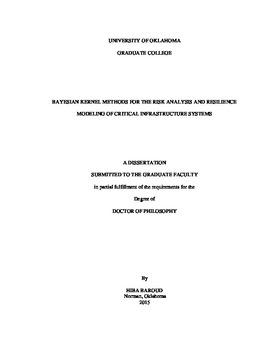| dc.description.abstract | The protection of critical infrastructures has recently garnered attention with an emphasis on analyzing the risk and improving the resilience of such systems. With the abundance of data, risk managers should be able to better inform preparedness and recovery decision making under uncertainty. It is important, however, to develop and utilize the necessary methodologies that bridge between data and decisions. The goal of this dissertation is to (i) predict the likelihood of risk, (ii) assess the consequences of a disruption, and (iii) inform preparedness and recovery decision making.
This research presents a data-driven analysis of the risk and resilience of critical infrastructure systems. First, a new Bayesian kernel model is developed to predict the frequency of failures and a Beta Bayesian kernel model is deployed to model resilience-based importance measures. Bayesian kernel models were developed for Gaussian distributions and later extended to other continuous probability distributions. This research develops a Poisson Bayesian kernel model to accommodate count data. Second, interdependency models are integrated with decision analysis and resilience quantification techniques to assess the multi-industry economic impact of critical infrastructure resilience and inform preparedness and recovery decision making under uncertainty.
Examples of critical infrastructure systems are inland waterways, which are critical elements in the nation’s civil infrastructure and the world’s supply chain. They allow for a cost-effective flow of approximately $150 billion worth of commodities annually across industries and geographic locations, which is why they are called “inland marine highways.” Aging components (i.e., locks and dams) combined with adverse weather conditions, affect the reliability and resilience of inland waterways. Frequent disruptions and lengthy recovery times threaten regional commodity flows, and more broadly, multiple industries that rely on those commodities. While policymakers understand the increasing need for inland waterway rehabilitation and preparedness investment, resources are limited and select projects are funded each year to improve only certain components of the network. As a result, a number of research questions arise.
What is the impact of infrastructure systems disruptions, and how to predict them? What metrics should be used to identify critical components and determine the system’s resilience? What are the best risk management strategies in terms of preparedness investment and recovery prioritization?
A Poisson Bayesian kernel model is developed and deployed to predict the frequency of locks and dams closures. Economic dynamic interdependency models along with stochastic inoperability multiobjective decision trees and resilience metrics are used to assess the broader impact of a disruption resulting in the closure of a port or a link of the river and impacting multiple interdependent industries. Stochastic resilience-based measures are analyzed to determine the critical waterway components, more specifically locks and dams, that contribute to the overall waterway system resilience. A data-driven case study illustrates these methods to describe commodity flows along the various components of the U.S. Mississippi River Navigation System and employs them to motivate preparedness and recovery strategies. | en_US |
